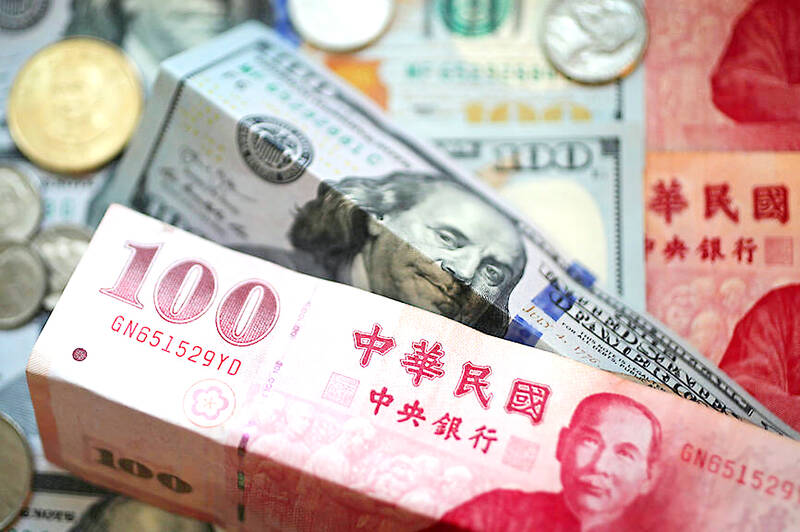President William Lai’s (賴清德) plan to further encourage Taiwanese businesses to invest in the US and increase the country’s defense budget is a good move after US President Donald Trump outlined his plan to impose tariffs on other countries, academics said.
After Trump on Thursday announced plans to impose reciprocal tariffs on exports from countries that he said have unfair trade policies toward the US, Lai held a national security meeting and laid out a plan to expand Taiwanese investment in the US and increase defense spending to 3 percent of GDP this year.
For the fiscal year 2025, the Cabinet had previously earmarked NT$647 billion (US$19.74 billion) for national defense, accounting for 2.45 percent of GDP.

Photo: CNA
“President Lai has the right idea in terms of how to manage his relationship with President Trump,” Hofstra University law professor Julian Ku (古舉倫) said.
Trump looks for allies with two key traits — the ability to manage defense with as little reliance on the US as possible, and the capacity to invest and trade with the US on terms that Trump feels are “fair,” he said.
“Lai’s goal should be to get Trump to think of Taiwan in a way that is similar to the way he currently thinks about Japan,” Ku said, adding that Lai’s proposals address both concerns that Trump is likely to raise.
However, Lai needs to deliver something tangible, given his administration cannot force Taiwanese companies to invest in the US and does not control the defense budget, which must be approved by the legislature, Ku said.
“A commitment to dramatically increase Taiwan purchases of US energy, including [liquefied natural gas] LNG, would demonstrate goodwill and get headlines,” he said, adding that such a move would show to the US that Lai has the power to offer tangible benefits that are easy to explain and understand.
Japanese Prime Minister Shigeru Ishiba met Trump for the first time on Friday last week, showing goodwill by committing to substantial investments in the US and making additional LNG purchases, which some analysts viewed as a successful diplomatic move.
Ku the following day wrote on X that Taipei should follow suit by buying as much US LNG as possible and suggested that it could be a way for the government to remind Trump that the nation would not be able to pay for the LNG if China blockades Taiwan.
Washington-based think tank Brookings Institution nonresident senior fellow Richard Bush called Lai’s plan “good will initiatives,” but said he was uncertain how the Trump administration would respond to them.
“More importantly, I suspect that, like the first Trump administration, this one does not have a coherent approach to Taiwan policy, at least as yet,” he said. “I personally believe that for the United States to make public complaints about the policies of a good friend like Taiwan is not necessarily conducive to effective bilateral cooperation based on shared interests.”

‘DENIAL DEFENSE’: The US would increase its military presence with uncrewed ships, and submarines, while boosting defense in the Indo-Pacific, a Pete Hegseth memo said The US is reorienting its military strategy to focus primarily on deterring a potential Chinese invasion of Taiwan, a memo signed by US Secretary of Defense Pete Hegseth showed. The memo also called on Taiwan to increase its defense spending. The document, known as the “Interim National Defense Strategic Guidance,” was distributed this month and detailed the national defense plans of US President Donald Trump’s administration, an article in the Washington Post said on Saturday. It outlines how the US can prepare for a potential war with China and defend itself from threats in the “near abroad,” including Greenland and the Panama

A magnitude 4.9 earthquake struck off Tainan at 11:47am today, the Central Weather Administration (CWA) said. The hypocenter was 32.3km northeast of Tainan City Hall at a depth of 7.3km, CWA data showed. The intensity of the quake, which gauges the actual effect of a seismic event, measured 4 in Tainan and Chiayi County on Taiwan's seven-tier intensity scale, the data showed. The quake had an intensity of 3 in Chiayi City and County, and Yunlin County, while it was measured as 2 in Kaohsiung, Nantou County, Changhua County, Taitung County and offshore Penghu County, the data showed. There were no immediate reports of

The Chinese Nationalist Party (KMT) is maintaining close ties with Beijing, the Democratic Progressive Party (DPP) said yesterday, hours after a new round of Chinese military drills in the Taiwan Strait began. Political parties in a democracy have a responsibility to be loyal to the nation and defend its sovereignty, DPP spokesman Justin Wu (吳崢) told a news conference in Taipei. His comments came hours after Beijing announced via Chinese state media that the Chinese People’s Liberation Army’s Eastern Theater Command was holding large-scale drills simulating a multi-pronged attack on Taiwan. Contrary to the KMT’s claims that it is staunchly anti-communist, KMT Deputy

RESPONSE: The government would investigate incidents of Taiwanese entertainers in China promoting CCP propaganda online in contravention of the law, the source said Taiwanese entertainers living in China who are found to have contravened cross-strait regulations or collaborated with the Chinese Communist Party (CCP) could be subject to fines, a source said on Sunday. Several Taiwanese entertainers have posted on the social media platform Sina Weibo saying that Taiwan “must be returned” to China, and sharing news articles from Chinese state media. In response, the Mainland Affairs Council (MAC) has asked the Ministry of Culture to investigate whether the entertainers had contravened any laws, and asked for them to be questioned upon their return to Taiwan, an official familiar with the matter said. To curb repeated